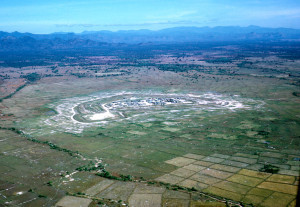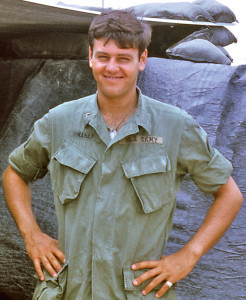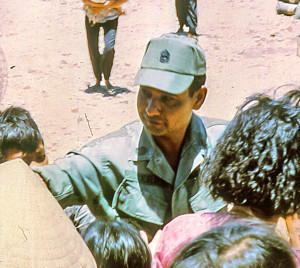Captain Hank Parker – Battery Commander – Part Six
Captain Hank Parker
PART SIX
On April 2, 1969 two boys of B Battery are killed by a landmine while minesweeping the road.
Shortly after Sherlock and Gulley are killed I leave the 3/506 infantry and go to LZ Sherry permanently. I consider it a promotion because I finally get my ass out of the field. I’m thinking Sherry is going to be safer than being out with the infantry. Far from the truth. When I went from patrolling with the South Vietnamese forces to deploying with Captain Wrazen and the 3/506 I went from the frying pan to the fire. Now at Sherry I am in the center of the fire. I’m in the bull’s eye. We are a forward unit in a fixed position along a major infiltration route: sitting ducks.

B Battery at LZ Sherry
The Ghost
The battery commander is constantly gone. Anytime he can find an occasion not to be at Sherry he takes off and goes to the rear to battalion. Even when he is at Sherry he is rarely out of his hooch. During attacks he is never to be seen. People call him The Ghost.
Understand that this captain is a nice guy. I like him. I like playing basketball with him, but that is the only time I see him out of his bunker other than to take a shower. Once I see him on top of our outdoor shower with its 55 gallon drum and Bunsen heater, dark smoke pouring out of the stack. I say to him, “Are you nuts standing up there? And with all that smoke flying you’re telling Charlie where to send the mortars.” After that I never see him up there again.
The captain knows what he was doing in terms of paperwork and things like that, seeing that the battery is resupplied. But he is never on a convoy, and never out when the mortars are falling. You need to have that presence for the men. That pretty much leaves it to me and First Lieutenant Chuck Monahan to run the battery. On paper Chuck is the XO (Executive Officer and second in command), but in reality he functions as the battery commander and I as his XO.

1st Lieutenant Chuck Monahan
Courtesy Rik Groves
Shrapnel-In-Your-Ass Policy
The first sergeant (the senior ranking sergeant generally called Top) has his favorites, carries grudges, creates make-work for the men, is overly punitive, and generally disappears during mortar attacks. Don’t get on his wrong side or he’ll try to get you. With all that I like him and I have good times with Top. I go over to his hooch and we drink Pabst Blue Ribbon, my favorite beer. We arm wrestle and oh my God I don’t stand a chance I’m such a skinny little runt. I laugh watching him sing Oh Danny Boy to Mulvihill – two Irishmen.
More than anything I feel this first sergeant is lax about perimeter defense and I have conflicts with him over making sure our wire is in place, not cut, the claymore mines are there and checked regularly. There are a lot of enemy units out there right near us. I know how close they are from my time with the 3/506 and how quick they can maneuver. Another lieutenant and Top disagreed over adding additional coils of concertina wire to the perimeter, an argument Top lost. When the lieutenant is out Top goes through his hooch checking for contraband to try to get something on him. The lieutenant confronts him and says he doesn’t ever want to see him in his hooch again. That’s the kind of guy my first sergeant is.
When he wants to give an Article 15 (non-judicial punishment), Monahan and I never sign off on it, not once. We tell him discipline has to be uniform. If you want to ding somebody because you think they are smoking pot, then you got to ding the same guys who are drinking alcohol and obviously impaired. You can’t choose one over the other. I say, “Once we do our inspection and find their stash and take it, that’s punishment enough. That costs them because we took their stuff. Give them a couple of extra details. Give them some extra duty to let them know that we are not going to tolerate this. You violated the rules and you are getting punished.” I do not see the necessity of, number one taking away money, and secondly taking away a stripe. I think that is too severe, particularly in light of what the men face day in and day out. Top does not appreciate the amount of work these guys do. They are working around the clock every day of the week. Life is miserable for them, and they are sleep deprived all the time. There is no need for petty or useless details.
I observe Top keeping a very low profile during rocket and mortar attacks. His great ambition is to get a Purple Heart, but without getting hurt too bad. After a mortar attack he comes to me with a gash on his forehead and claims he came charging out of the bunker and hit his head. He says he should get a Purple Heart for that because we were under enemy fire. I say, “Top, I don’t know that you got that cut on your head coming out of the bunker; I think maybe you got it going into the bunker. Here is the policy that I follow for Purple Hearts out here and that you will follow. You’ll never get a Purple Heart until Doc Townley takes a piece of shrapnel out of your ass.”
Top and I also clash over who gets medals. These are medals from the Vietnamese government – the Vietnamese Cross of Gallantry (for deeds of valor or heroic conduct while in combat with the enemy) and the Civil Actions Medal (for outstanding achievements in the field of civil affairs). A list would come down with how many we had to distribute in the battery. Top would get his senior sergeants together to determine who were going to get medals. This practice Lieutenant Monahan and I change. No, you get your gun chiefs and you bring them into the meeting. You let them determine who on their guns should get one of these medals.
Top objects, saying these guys are just draftees. It has no meaning for them because they are not going to be career soldiers. At that time I do not understand what he means, but later learn that for career soldiers medals earn points for promotion. However, and this surprises me, the only medal that does not earn points is a Purple Heart. So I never knew why he wanted a Purple Heart, other than to say, “I was wounded.”
Scorpion Fights
When I came to Sherry there was me and three other lieutenants and we’re all in the same hooch. One of them liked to bring food back from the mess hall and eat in the hooch. I said I didn’t want any food in the hooch because it brings in the rats. And the rats bring in the snakes. So I decide I’ll build my own hooch. This is when I first meet Andy Kach, a PFC at the time. I think his name is Johnny Cash, because somebody gave him gave him the nickname. He comes up in these big dark glasses and says, “Hey lieutenant, can I help you with that?”
I say, “Sure.”
In the process of digging down to start the hooch foundation we find a bunch of scorpions and everything stops. Huge black scorpions. Guys from the guns come over because they want to see them. So we catch a bunch of scorpions, make a little ring, and instead of building a hooch we’re going to have scorpion fights. We’re placing bets on these scorpions. That memory is so vivid I don’t remember ever finishing the hooch.

Sergeant Cerda – Chief of Smoke
(senior sergeant in charge of the howitzers, usually called just Smoke or Chief)
Courtesy Rik Groves
Chief Cerda says to me, “Lieutenant, come with me to the First Sergeant, we’ve got something.” We go out to the wire to where a unit of the South Vietnamese infantry is located. Top and Cerda have a LAW (light anti-tank weapon), a portable rocket fired from the shoulder and with plenty of punch. They are playing with this thing, neither one of them knowing how to operate it. I had seen the infantry with them so I showed them how to shoot it. They say, “You shoot it.” So I flip up the sight and fire it. The projectile just goes PLOOP and drops out of the tube and lands at my feet. They both run! And if I had any sense I would have too.
When mortars land we do crater analysis on them. You run out and shoot a back azimuth from the fin sticking out of the ground, and that gives you the direction from which the mortar had come. In order to do that you have a compass, which you read by the light of the flares in the air and a flashlight. You send the direction and distance to Fire Direction and quick as you can a gun blasts the hell out of that area. You’ve got to do it fast, while the mortars are still coming in.
Chief Cerda is there with me holding the flashlight. I don’t know his nationality but he has a heavy Hispanic accent and he gets really excited. I say, “Slow down, Chief, I can’t understand you. And quit moving the light.” I think he’s saying, Hurry up, let’s get the hell out of here.
I’ll say this about Chief Cerda, he knows the guns. He knows howitzers, how to fire them, how to keep them clean, and how to train the guys on them. He is really good. That is important to me because I don’t think the first sergeant knows guns all that well. If he does he does not display it to me. And you never see the first sergeant and The Ghost out during a mortar attack doing crater analysis like they’re supposed to be. It’s just me and Chief Cerda.
The guys like Smoke. He relates to the men on the guns and to the officers. When the officers go to the captain’s hooch for beer Cerda always comes in with us. Tommy Mulvihill comes in too. (Picture of Mulvihill sitting on Cerda’s lap and me petting my little dog.) Cerda is pretty good at crossing between officers and enlisted, going back and forth, but not as good as Tommy.
One night after too much imbibing, Chief Cerda and I get my AK-47. Cerda puts on black pajamas like a Viet Cong and we’re going to go out to the road, and we’re going to catch VC planting mines. We start to crawl out through the wire past Tower 1 by the main gate. Cerda gets his butt caught in the wire and sets off a flare. He’s brown, and he’s short and he’s got black pajamas on, and he’s in the wire. He yells at the guy in the tower, “Don’t shoot, it’s me.” The guy in the tower can see me too, and I’m white as a ghost anyway. The guy in the tower has to think, What the hell is going on here?
We did not think this operation through very well.



